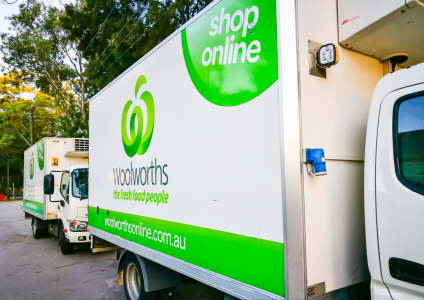Woolworths to investigate suppliers’ 'unauthorised deductions' claims
Following recent revelations, supermarkets are once again in the spotlight.
While we generally think of them as our friendly neighbourhood go-to for groceries, it seems they might not play as nice when it comes to their dealings with suppliers.
Grocery giants have allegedly been involved in giving their suppliers quite the short end of the stick. As per a recent report, various suppliers have suffered 'unauthorised deductions' from their payments.
Complaints were made to the government’s independent reviewer of a voluntary code of conduct. This governs the relationship between the food and grocery manufacturing sector.
It was revealed that these supplier rip-offs are an industry-wide problem.
Woolworths was quick to spring into action, promising it would investigate these concerning allegations.
'We will fix it,' claimed Woolworths CEO Brad Banducci.
According to the report, all major supermarket chains have been involved in this issue. However, ALDI, Coles and Metcash (behind IGA) haven’t responded to these allegations.
Under the law, suppliers and other small businesses are accorded certain protections.
‘It is illegal for a business to behave in a way that misleads or deceives, or is likely to mislead or deceive, consumers or other businesses,’ according to the Australian Consumer and Competition Commission (ACCC). This includes cases where there was no intent on a business’s part to trick anyone, or no loss or damage was incurred by a certain party.
The ACCC also warns businesses against ‘unconscionable conduct’ with customers or other businesses.
Often overlooked, the relationship between supermarkets and their suppliers is a delicate and complex ecosystem likened to a finely tuned orchestra with every instrument playing a synchronous part. Predominantly, those off the supermarket floor perceive only the crescendo—the finished product on the shelves. The many moving parts involved in creating that product, specifically the relationship between retailer and producer, are left unseen.
The symbiotic relationship between supermarkets and their suppliers can also be viewed through the give-and-take dynamics, which foster efficiency and productivity. The supermarkets, in this context, are figuratively seen as the market gatekeepers. They order, store, and subsequently make products available to consumers. In return, suppliers are expected to consistently deliver superior quality goods that meet their stringent quality guidelines and the consumer's expectation of value for money.
However, allegations of unauthorised deductions from supplier invoices strike a dissonant chord in this seemingly harmonious relationship. Many suppliers feed into the big supermarket chains expecting fair treatment and timely payments. But if the orchestra is not playing in tune, it can cause distressing ripple effects.
Consider the humble farmer supplying tonnes of fresh produce to the city supermarkets. An unexpected deduction from an already tight margin invoice can have a significant impact on their livelihood and business viability. At the same time, it questions the integrity of the supermarkets' business practices.

The current situation provides a stark reminder that maintaining a balanced and transparent relationship between supermarkets and suppliers is not only crucial for a healthy supply chain, but it plays an intrinsic role in good corporate governance and establishing consumer trust. After all, the relationship is inexorably intertwined—one cannot exist in harmony without the other playing its part.
So, as the saying goes, it's important to ensure all the orchestra's players are getting their fair share of applause... or, in this case, fair payments for produce supplied!
What do you think of this story, members? Share your thoughts in the comments below!
While we generally think of them as our friendly neighbourhood go-to for groceries, it seems they might not play as nice when it comes to their dealings with suppliers.
Grocery giants have allegedly been involved in giving their suppliers quite the short end of the stick. As per a recent report, various suppliers have suffered 'unauthorised deductions' from their payments.
Complaints were made to the government’s independent reviewer of a voluntary code of conduct. This governs the relationship between the food and grocery manufacturing sector.
It was revealed that these supplier rip-offs are an industry-wide problem.
Woolworths was quick to spring into action, promising it would investigate these concerning allegations.
'We will fix it,' claimed Woolworths CEO Brad Banducci.
According to the report, all major supermarket chains have been involved in this issue. However, ALDI, Coles and Metcash (behind IGA) haven’t responded to these allegations.
Under the law, suppliers and other small businesses are accorded certain protections.
‘It is illegal for a business to behave in a way that misleads or deceives, or is likely to mislead or deceive, consumers or other businesses,’ according to the Australian Consumer and Competition Commission (ACCC). This includes cases where there was no intent on a business’s part to trick anyone, or no loss or damage was incurred by a certain party.
The ACCC also warns businesses against ‘unconscionable conduct’ with customers or other businesses.
Often overlooked, the relationship between supermarkets and their suppliers is a delicate and complex ecosystem likened to a finely tuned orchestra with every instrument playing a synchronous part. Predominantly, those off the supermarket floor perceive only the crescendo—the finished product on the shelves. The many moving parts involved in creating that product, specifically the relationship between retailer and producer, are left unseen.
The symbiotic relationship between supermarkets and their suppliers can also be viewed through the give-and-take dynamics, which foster efficiency and productivity. The supermarkets, in this context, are figuratively seen as the market gatekeepers. They order, store, and subsequently make products available to consumers. In return, suppliers are expected to consistently deliver superior quality goods that meet their stringent quality guidelines and the consumer's expectation of value for money.
However, allegations of unauthorised deductions from supplier invoices strike a dissonant chord in this seemingly harmonious relationship. Many suppliers feed into the big supermarket chains expecting fair treatment and timely payments. But if the orchestra is not playing in tune, it can cause distressing ripple effects.
Consider the humble farmer supplying tonnes of fresh produce to the city supermarkets. An unexpected deduction from an already tight margin invoice can have a significant impact on their livelihood and business viability. At the same time, it questions the integrity of the supermarkets' business practices.
Key Takeaways
- A news outlet reports that ‘unauthorised deductions’ were made to supermarket giants suppliers.
- Woolworths has vowed to investigate complaints from its suppliers after concerns were raised to the independent reviewer of the supermarket chain's voluntary code of conduct.
- Other retailers like Coles, ALDI and Metcash (behind IGA) have not responded to the allegations yet.
- Suppliers and other small businesses are also protected by the law.
- The relationship between supermarkets is a complex and fragile one, and issues like ‘unauthorised deductions’ serve to disrupt the balance between the two. This puts everyday consumers at risk.
The current situation provides a stark reminder that maintaining a balanced and transparent relationship between supermarkets and suppliers is not only crucial for a healthy supply chain, but it plays an intrinsic role in good corporate governance and establishing consumer trust. After all, the relationship is inexorably intertwined—one cannot exist in harmony without the other playing its part.
So, as the saying goes, it's important to ensure all the orchestra's players are getting their fair share of applause... or, in this case, fair payments for produce supplied!
What do you think of this story, members? Share your thoughts in the comments below!








